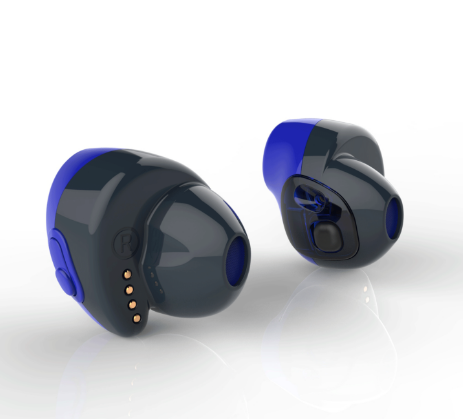CES 2018: Qualcomm debuts Bluetooth SoC for wireless audio devices

LAS VEGAS -- Qualcomm has announced an integrated Bluetooth audio system on chip (SoC) that the company says will reduce power consumption and double processing power within small form factor audio products like wireless earbuds and headsets.

A prototype of biometric earbuds by Qualcomm.
The QCC5100 series has Bluetooth 5 dual-mode radio, low power audio and application subsystems, and integrated active noise cancellation (ANC) built in.
Qualcomm said the integrated chip is key to bringing down the price and size of wireless audio devices while also prolonging battery life.
Simply put, Qualcomm is aiming to form the foundation of wireless devices that can actually maintain battery life -- -- a major pain point for wireless tech users.
The consumer speaker market is seen as a high growth area for Qualcomm, particularly over the last few years, as companies like Apple have stripped the headphone jack from its next-generation iPhones.
In a briefing, Qualcomm's SVP of its voice and music business, Anthony Murray, noted that the QCC5100 series will open new possibilities for earbuds with biometric sensing, as well as augmented hearing and virtual assistant capabilities.
"As these products become smaller and more intelligent, users want to wear them for than just music or a phone call," Murray said. "This is driving a significant push in the power consumption and processing power that you need in such small form factors."
Qualcomm also made a bevy of partnership announcements during its Monday press conference. On the automotive side, the company said it's now working with Jaguar and Land Rover for powering the infotainment and telematic systems with Snapdragon.
Additionally, the company inked a partnership with Honda to power connected car technology in the 2018 Accord, and another with Chinese automaker BYD for upcoming vehicles to include a digital cluster powered by Snapdragon.
Qualcomm also announced flagship device partnerships with Google, HTC, LG, Sony and Samsung tied to its radio frequency front-end (RFFE) platform, as well as voice UI partnerships with Amazon Alexa, Google Assistant, and Microsoft Cortana.
Hugo Barra, VP of VR at Facebook, was on hand during the press event to talk about the Oculus Go headset that was announced last year. Barra said the standalone VR product is built on the Qualcomm mobile VR platform and will ship with the Snapdragon 821 chipset.
Xiaomi and Facebook are also teaming up for a brand new VR device, the Mi VR Standalone, built exclusively for the China market. It shares the core hardware with Oculus Go and supports the Oculus mobile SDK. Notably, this will allow existing VR developers to bring their VR content to Chinese consumers.